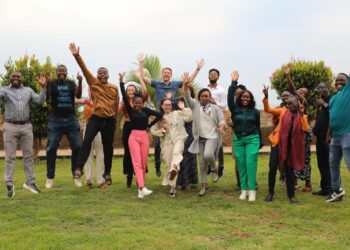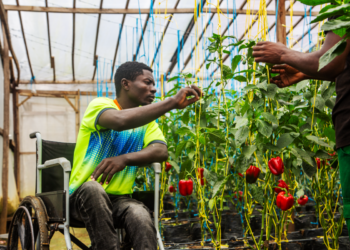Students of innovation have traditionally been confined to business or engineering programmes, but it’s time to break out of this pattern. This could help the world find novel solutions to a growing list of crucial, complex challenges.
In this era of social change, growing economic inequality and climate crisis, social innovation education could be the solution. This is a transformative approach to collective problem-solving that transcends disciplinary boundaries, involving citizens and “changemakers” from all walks of life in tackling the world’s most pressing issues.
Social innovation isn’t just for businesses. It’s about collaboration by people with diverse perspectives to address problems that go beyond borders and subjects. It’s about more than creating products and services; it’s about devising new business models and policies to confront social, economic and environmental challenges head-on.
According to Vanina Farber, Professor and elea Chair for Social Innovation at IMD Business School: “Social innovation is driven by purpose, partnership and accountability, in order to develop solutions that enable traditionally excluded people to participate in the economy.”
Social innovation education is still in its infancy. But theories grounded in design, creativity and education are shaping its early development. The aim is to create an educational environment that encourages people to think and learn about social innovation, as well as practice it. This will prepare them to go out into the world and create social innovation solutions.
Why teach social innovation?
There’s no one-size-fits-all formula for social innovation, which means educators can use different teaching methods – from collaborative problem solving, to design and systems thinking.
Design thinking, for instance, integrates design disciplines with social sciences to address difficult societal and environmental problems. Systems thinking, on the other hand, helps people understand how the various parts of a system interact with and impact one another.
Social innovation education must also encompass a variety of topics, including innovation, creativity, social justice, climate change, public policy and business. This means students need a diverse array of skills and perspectives to understand this topic, which are also constantly changing. In essence, there are multiple strands to both comprehending social innovation and effectively conveying its principles to others.
How to teach social innovation?
To prepare global citizens to consider and create solutions for the world’s ever-changing problems, our education systems must incorporate three key elements:

The three elements of social innovation education Image: Lyons, R. & Bender-Salazar, R. (2023). Social Innovation Pedagogies: Sustainable models for future entrepreneurs, intrapreneurs and citizens
1) Encouraging empathy
Teachers must help their students learn how to seamlessly transition between their real and imagined social identities. This flexibility helps them look at social situations from a personal standpoint, but also from a broader global or systemic perspective.
Educators can use various methods to do this, such as reading case studies with students, asking them to write reflective essays on their experiences of learning and encouraging role-play of potential interventions – anchoring the theory in the practice of social projects within the local community.
Hands-on interaction within a local context can be a powerful teaching tool. The emergence of virtual reality and augmented reality technologies also introduces exciting possibilities for social innovation education. Immersive tools allow students to engage more, virtually stepping into the shoes of people facing challenges in diverse environments – from wars to areas impacted by climate change.
2) Finding the locus of control
The concept of the internal Locus of Control (LOC) revolves around someone’s perception of control over their career path or life stages. People with a high internal LOC attribute their successes or failures to personal efforts rather than luck. On the other hand, people with a low internal LOC tend to believe that external forces shape their life.
In social innovation education, we underscore the crucial role of LOC in shaping ethical behaviour and fostering entrepreneurial skills among students. To drive this point home, we show students that the actions of one person, particularly when using their innovative capacity, can bring about positive change in a community or beyond.
We also discuss the ripple effect that decisions made by people in power can have on critical resources and societies. To do this, we use guest speakers, excursions to companies, community resource centres and political events, as well as volunteerships.
3) Speculative thinking
Speculative thinking, creativity, design thinking, innovation and imagination all play a pivotal role in design science thinking, urging students to explore future scenarios and possibilities. When considering new situations as part of their social innovation education, students learn about the constraints people in these situations face. These constraints are shaped by people’s networks and the limited time they have for meaningful collaboration. This affects the depth of insight they can gain when trying to solve a problem.
For example, a student of graphic design may not be as familiar with geology or architecture, but both fields have inevitably impacted their lives in some way. By opening students’ eyes to the possibilities of learning, imagining and creating in this way, they can approach problem-solving with insights, not only from their own expertise and experience, but from other areas too.
Importantly, social innovation education encourages students to explore what they don’t know, to reach out and collaborate with others, and to seek knowledge from diverse, novel and transdisciplinary sources.
Why now for social innovation education?
We face many global challenges right now that affect all of humanity, not just isolated groups. Social innovation outlines an accessible path to a solution that will help all citizens. This kind of education can and should occur in and out of the classroom – in businesses, government organisations and anywhere people are tasked with tackling difficult problems.
The domain of social innovation education is ripe for exploration in this way. Researchers and practitioners should participate in both theoretical and practical discussions. They should embrace quantitative, qualitative, experimental and action-based research to really understand how knowledge, expertise, creativity and imagination can help solve the world’s most difficult problems.
Social innovation education will also help foster consensus and mutual understanding of how solutions don’t just come from one source. We must respect and collaborate across various areas of expertise and education, as well as different demographies, localities, identities and histories. This kind of collaborative learning can help social innovation education move beyond the classroom to tackle 21st-century challenges.
This article is part of: World Economic Forum Annual Meeting. It was first published by the World Economic Forum.










